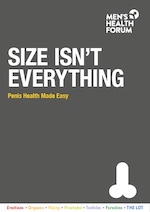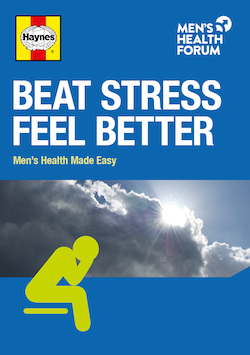Know Your Knob: all our penis health links
Mid-life crisis: the best thing that ever happened to you?

Most of the emails to MHF male health are from men — no surprise there. But when we do hear from women, by far the most popular topic is the mid-life crisis. More particularly, the male mid-life crisis.
Usually he's distant, having an affair or has just quit his job. Often all three.
Now, I'm not defending adultery or betrayal but I am going to try to explain how they happen and why I think that in the long term, the mid-life crisis is a good thing.
First of all, it's not particularly accurate to think of it as a crisis. Crisis implies something unusual which this isn't. In fact, the sort of psychological readjustment which this 'crisis' represents is perfectly normal.
Indeed, although both can very traumatic, what we're talking about here is no more a crisis than is puberty.
And while it often happens in mid-life it can occur much earlier or much later. Perhaps, to use a physical analogy, it's best seen as the psychological version of wisdom teeth — the last bit of growing up, something that usually happens much later than the other bits of growing up. And which, as with wisdom teeth, for some people may never come at all.
Here's how it happens. Human children, like all animal babies, are incredibly socialised. They're helpless and learn by copying and imitating yet, in this vulnerable, ill-equipped state, they will make some big decisions about their future.
Taking up hobbies and sports, choosing subjects at school, beginning careers, falling in love, starting families — these all happen when we're young: at a time when we don't have any experiences of our own to draw on - only those of others to copy or imitate - and when our thinking is still coloured by the 'magical thinking' of childhood.
While we have generally grown out of thinking the world revolves around us, most of us in our teens and 20s still tend to think that we are protected, blessed or special in some way. (Even people who are special in some way — those with an extraordinary talent or gift — are just the same as everybody else in every other respect and for them coming to terms with their 'ordinariness' is arguably tougher than for the rest of us.)
To put it bluntly, we don't know ourselves very well when we start life's journey.
The result is that many of us wind up making choices which aren't 100% true to what we really are. Most of us, in fact. We do things our parents want, follow careers we think are respectable or lucrative rather than because they are our vocations, mistake love for lust and form lifetime partnerships on the basis of this hormonal roller-coaster which, although wonderful, can only ever be short-term ...
That's how adult life begins for us all and, within the space of a few short years, we suddenly find ourselves playing all these adult roles while still feeling like kids inside. We tell ourselves that we'll grow into it. If we behave like an adult, sooner or later we'll feel like one. This can go for a long-time. Let's call this, as some psychotherapists do, the first adulthood. The move from here into second adulthood often looks, from the outside, like the thing we're calling a mid-life crisis.
This thing is not an invention of modern society although it sometimes looks like it. Life used to be nasty, brutish and short. But, in the UK today, people live for far longer; many have money enough to think beyond the material needs of food and shelter to intangibles such as the soul, the spirit and, yes, 'being happy'; and they have choices. Umpteen choices.
The mid-life crisis is an internal conflict between the choices you made and the choices you wish you'd made (or would have made had you known yourself better), a psychological conflict between the life that you're living, the roles that you're playing and what you truly are.
Second adulthood, if you can get there, is about accepting your own mortality and your own 'ordinariness'.
By ordinary, I don't mean dull or uninteresting, I mean quite the opposite. What I am talking about is understanding that you are special only in the sense that everyone else is — as a unique human being. (This is a very special specialness — a specialness we can have no doubts about.) Second adulthood is about knowing yourself better, knowing what makes you happy and doing it, making choices based on your own values and desires and not anyone's else's. Not easy. Not always affordable. But possible. This is why some of today's retired generation are having the time of their lives.
There's no right or wrong about this. People can experience this 'crisis' at any time. After years of singing someone else's song, Britney Spears gives every impression of going through hers right now, age 25. I reckon Andre Agassi had his just before he hit 30 when, after slumping to 140 odd in the world he came back to establish himself as one of the best players the game has ever seen and a very nice guy to boot.
At the same time, there are many men still in first adulthood in their 60s or 70s. Some seem pretty happy on it — Peter Stringfellow is the sort of bloke who springs to mind. Others are in a more difficult place: showing the signs of crisis but reluctant to admit it to anyone, especially themselves. It is very difficult for men to confess that, in the words of the song, 'rock and roll, I gave you all the best years of my life.'
There are even some lucky souls whose second adulthood is so close to their first that the rest of us hardly notice the transition.
But the reason why the crisis occurs in mid-life for most people is that many of the triggers that can force us to start looking seriously at ourselves and our lives also happen in mid-life.
Careers can stagnate and not live up to their promise. Geographical mobility can leave us further from our roots. Children become more independent. Our own parents get older, need help and — a frequent trigger — die. If that's not enough, the aches and pains in our own body serve as a daily reminder of our own mortality.
Perhaps more than any other, it is the grudging acceptance of the inevitability of our own appointment with death that gives us the kick up the arse we need: it's now or never.
Initially, the things that must be done 'now or never' may appear pretty pathetic to a non-male: buying a sports car, taking up the latest extreme sport or sleeping with a teenager, for example. What is going on is that the man is trying to revisit the choices made when he was younger. (Women do this too at this time in their lives. Those who have been at home looking after kids often find themselves looking towards the job market and/or having affairs themselves.)
But if those revisted choices are still based on poor self-knowledge, mistaken premises and inherited assumptions they won't be any better than the first time. Probably worse. A man who has learned nothing may well find himself repeating the mistake of choosing a long-term partner on the basis of immediate sex-appeal.
If you're his wife, you'll just have to hope he chooses the sports car. He'll probably get bored of it sooner and won't, in most cases, feel the urge to impregnate it.
But the aches and pains and all they herald for the future are not the only physical trigger of the crisis. For men, the hormone that once got them chasing after all those first adulthood goals with such enthusiasm is on the wane.
Testosterone levels begin to fall from the age of around 40. Replacing lost testosterone — HRT for men — might well help to prolong first adulthood for a while but it's only delaying the inevitable. Of course, declining testosterone is, especially for men who have always done most of their thinking with their dick, very scary. The art of second adulthood is to see it as a great opportunity to think about something else instead.
Page created on May 1st, 2007
| This article reflects the experience of the individual. It is not health information from the MHF under the terms of the NHS England Information Standard. It was last updated in 2010. |
|
The Men’s Health Forum need your support It’s tough for men to ask for help but if you don’t ask when you need it, things generally only get worse. So we’re asking. In the UK, one man in five dies before the age of 65. If we had health policies and services that better reflected the needs of the whole population, it might not be like that. But it is. Policies and services and indeed men have been like this for a long time and they don’t change overnight just because we want them to. It’s true that the UK’s men don’t have it bad compared to some other groups. We’re not asking you to ‘feel sorry’ for men or put them first. We’re talking here about something more complicated, something that falls outside the traditional charity fund-raising model of ‘doing something for those less fortunate than ourselves’. That model raises money but it seldom changes much. We’re talking about changing the way we look at the world. There is nothing inevitable about premature male death. Services accessible to all, a population better informed. These would benefit everyone - rich and poor, young and old, male and female - and that’s what we’re campaigning for. We’re not asking you to look at images of pity, we’re just asking you to look around at the society you live in, at the men you know and at the families with sons, fathers and grandads missing. Here’s our fund-raising page - please chip in if you can. |




